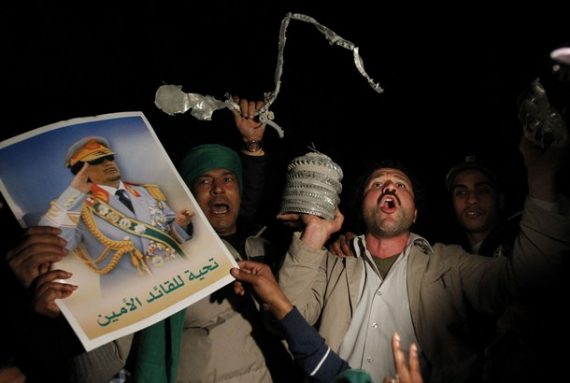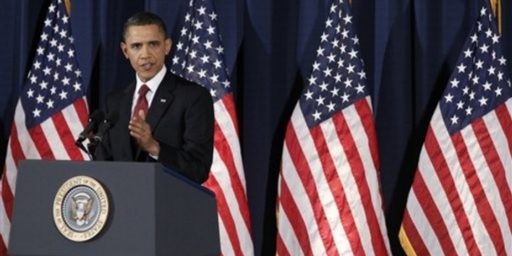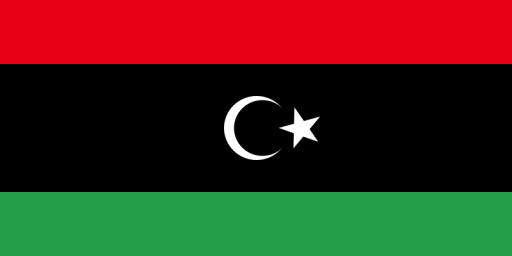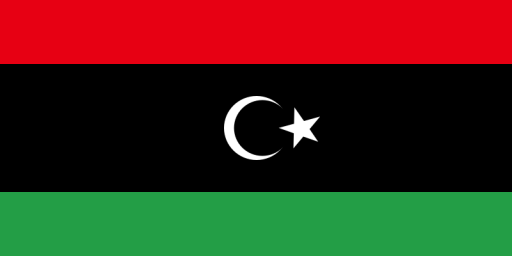Libya Coalition Politics
The uneasy coalition that coalesced around action in Libya will be strained by decisions to come.
The Arab League, whose call for action in Libya was a key factor in persuading President Obama to join France and the UK in fighting for an international military response, has quickly condemned said response.
WaPo‘s Edward Cody (“Arab League condemns broad Western bombing campaign in Libya“):
The Arab League secretary general, Amr Moussa, deplored the broad scope of the U.S.-European bombing campaign in Libya and said Sunday that he would call a league meeting to reconsider Arab approval of the Western military intervention.
Moussa said the Arab League’s approval of a no-fly zone on March 12 was based on a desire to prevent Moammar Gaddafi’s air force from attacking civilians and was not designed to endorse the intense bombing and missile attacks — including on Tripoli, the capital, and on Libyan ground forces — whose images have filled Arab television screens for two days.
“What is happening in Libya differs from the aim of imposing a no-fly zone,” he said in a statement carried by the Middle East News Agency. “And what we want is the protection of civilians and not the shelling of more civilians.”
Moussa’s declaration suggested that some of the 22 Arab League members were taken aback by what they have seen and wanted to modify their approval lest they be perceived as accepting outright Western military intervention in Libya. Although the eccentric Gaddafi is widely looked down upon in the Arab world, the leaders and people of the Middle East traditionally have risen up in emotional protest at the first sign of Western intervention.
A shift away from the Arab League endorsement, even partial, would constitute a major setback to the U.S.-European campaign. Western leaders brandished the Arab League decision as a justification for their decision to move militarily and as a weapon in the debate to obtain a U.N. Security Council resolution two days before the bombing began.
[…]
Russia and China, which abstained from the voting on the U.N. Security Council resolution authorizing military intervention, also expressed regret that Western powers had chosen to get involved despite their advice.
In the Middle East, the abiding power of popular distrust of Western intervention was evident despite the March 12 Arab League decision. It was not clear how many Arab governments shared the hesitations voiced by Moussa, who has said that he plans to run for president in Egypt this year. But despite Western efforts to enlist Arab military forces, only the Western-oriented Persian Gulf emirate of Qatar has announced that it would participate in the campaign.
Meanwhile, the West is likely to expand the scope of operations to achieve the obvious political objectives. Patrick Wintour and Ewen MacAskill for The Guardian (“Gaddafi may become target of air strikes, Liam Fox admits“):
Critics claimed that the coalition of the willing may have been acting disproportionately and had come perilously close to making Gaddafi’s departure an explicit goal of UN policy.
Russia, which abstained on the UN vote last week, called for “an end to indiscriminate force”. Despite denials from coalition forces, Alexander Lukashevich, Russia’s foreign ministry spokesman, said that the coalition had hit non-military targets. He suggested that 48 civilians had been killed. “We believe a mandate given by the UN security council resolution – a controversial move in itself – should not be used to achieve goals outside its provisions, which only see measures necessary to protect civilian population,” he said.
[…]
The British defence secretary, Liam Fox, said the scale was in line with UN resolutions that had been “essential in terms of the Gaddafi regime’s ability to prosecute attacks on their own people”. He also said it was possible that Gaddafi himself could become a target of air attacks if the safety of civilians could be guaranteed.
Ahead of a Commons debate and vote tomorrow, leading figures in David Cameron’s cabinet were under pressure to clarify whether the explicit purpose of the attacks was to render Gaddafi’s regime so powerless that it collapses.
Speaking on the Politics Show, Fox said: “Mission accomplished would mean the Libyan people free to control their own destiny. This is very clear – the international community wants his regime to end and wants the Libyan people to control for themselves their own country.” He then added: “Regime change is not an objective, but it may come about as a result of what is happening amongst the people of Libya.”
[…]
In the US, the Obama administration was more restrained in its language. Admiral Mike Mullen, the chairman of the US joint chiefs of staff, appearing on NBC’s Meet the Press, insisted the campaign was only a limited, humanitarian operation, not a war, and was not aimed at regime change, as both Cameron and Sarkozy have suggested.
“The goals of this campaign are limited. It is not about seeing him [Gaddafi] go. It is about supporting the UN resolution.” Asked if the mission could be accomplished with Gaddafi still in power, Mullen replied: “This is one outcome.”
But that may be wishful thinking on part of the military, as the statements from key policymakers seem to belie the notion of limited goals. Reporting for the NYT (“Allies Target Qaddafi’s Ground Forces as Libyan Rebels Regroup“), David Kirkpatrick and Elisabeth Bumiller note, “the campaign may be balancing multiple goals. President Obama, Secretary of State Hillary Rodham Clinton and British and French leaders have also talked of a broader policy objective — that Colonel Qaddafi must leave power.”
Meanwhile, Guardian’s Jonathan Freedland (“Libya crisis may save Nicolas Sarkozy from electoral humiliation“) considers the domestic politics within the coalition, noting that one factor that drove French president Nicolas Sarkozy to intervene was the confluence of scheduled elections and low poll numbers. While he doesn’t accuse of Sarkozy of, to use 1990s parlance, “wagging the dog,” he does not that there are “some in the president’s inner circle wondering if Operation Odyssey Dawn might just save the skin of a man who, a matter of days ago, seemed destined for electoral humiliation. Ever so discreetly, they will be hoping Libya can do for Sarkozy what the Falklands did for Margaret Thatcher – anoint a successful war leader deserving of re-election.”
An ultimate decision on the endgame must be reached at some point soon, if it hasn’t already. The Obama administration had gone out of its way to say that the United States is not leading this effort and will soon move into a supporting role. It has already been announced that command will soon pass from new AFRICOM boss Carter Ham to “either a UK-France coalition or NATO.”
Gates is signaling that the United States would be willing to accept a less-than-ideal outcome, with Gaddafi remaining in power. But he also indicated that a partitioned Libya would not be acceptable. “I think all countries probably would like to see Libya remain a unified state. Having states in the region begin to break up because of internal differences is a formula for real instability in the future.”
Steven Metz, an expert on insurgency at the Army War College, sees such a mess as likely.
History offers a number of sign posts that an insurgency will occur. Unfortunately Libya has almost all of them. At this point the political objectives of the government and anti-government forces are irreconcilable. Each side wants total victory—either Qaddafi will retain total power or he will be gone. Both sides are intensely devoted to their cause; passions are high. Both have thousands of men with military training, all imbued with a traditional warrior ethos which Qaddafi himself has stoked. The country is awash with arms. Libya has extensive hinterlands with little or no government control that could serve as insurgent bases. Neighboring states are likely to provide insurgent sanctuary whether deliberately—as an act of policy—or inadvertently because a government is unable to control its territory. North Africa has a long history of insurgency, from the anti-colonial wars of the nineteenth and twentieth centuries to more recent conflicts in Chad, Algeria, and Western Sahara. Where insurgency occurred in the past, it is more likely to occur in the future. All this means that there is no place on earth more likely to experience an insurgency in the next few years than Libya.
[…]
Unfortunately, there is little the United States can do to prevent an insurgency short of a full-scale military intervention to force Qaddafi’s removal. And that isn’t going to happen. What Washington can do, though, is begin thinking about how it would respond to insurgency.
Should Qaddafi hang on to power and the coming insurgency pit anti-government rebels against his regime, the United States would first have to decide whether it sought to pressure both sides toward a negotiated solution (something unlikely to happen until they have fought long enough to conclude that outright victory was unlikely) or whether it wanted a rebel victory. If a negotiated settlement was the goal, the United States and its allies would need to provide assistance, advice, and training to the rebels, both to prevent their defeat and to encourage them to avoid attacking civilians and to reject extremists. If a rebel victory was the goal, this sort of help would need to be even more extensive.
The Obama administration, then, is likely going to have to either find itself drawn into a much larger intervention than it wishes or will have to accept an outcome with more bloodshed than would have been likely had Gaddafi been allowed to continue his rout of the rebels. The Arab League is unlikely to be on board with either. And the decision-making process will severely test the US-France-UK alliance.
Photo: Reuters Pictures.







Galrahn confirms that an expansive interpretation of Res. 1973 prevails.
Here’s something that troubles me: we know what the Libyan rebels are against — K-Daffy.
Does anyone have any idea just what they’re for?
What assurances do we have that they won’t actually be worse than him?
J.
Not only that I’m not sure there’s any reason to believe they can form a government to preserve order in Libya. As I understand it the purpose of the intervention in Libya is to preserve human life not merely to preserve Libyan rebel life.
That’s why I repeat my suggestion: if the Qaddafi government falls as a consequence of the intervention, why won’t Britain, France, and the U. S. both in fact and in law become occupying powers with the responsibility to preserve order there?
My suspicion is that the Arab League only approved the no fly zone to server as a distraction for the crackdown against the protestors in Bahrain. Their complaining means they now think they’ve got a handle on that situation.
It is very misleading to quote that one Arab League statement, and not the later clarifications.
The Arab League is starting to remind me of the Democrats who voted for the AUMF in Iraq. I am particularly reminded of Hillary Clinton’s “I only voted for Bush to bluff — I had no idea he’d actually take the actions authorized in it!”
J.
Jay, “Saber Rattling” is another ancient reality. When it works it is way, way, better than drawing the sword. I actually opposed on that vote, but afterward I did hope like hell that GWB had the sense to just rattle for what he wanted.
He actually got it, remember? Saddam accepted a new round of inspections, but GWB’s blew him off, because that’s not really what he wanted.
It never was about WMDs. Hence the painful humor of GWB’s “looking under the desk for WMDs” video.
john, what happens when you’ve convinced the other side that instead of a saber, you’re ratting a child’s toy?
J.
JP, the Arab League backing away from their position is just a matter of time I believe. They will not have patience for videos of dead Arabs. (This morning it was reported that Gadaffi has ordered the morgues emptied to spread bodies at bombing sites.)
I don’t know Jay, what’s that feel like for you?
PD, the frustrating thing for me so far has been how few people can read this for what it is, and respond to it for what it is.
More than anything this episode at OTB (and similar) has been a study in Bounded Rationality.
Essentially everyone is responding based on a template they had in their head for US action, and they were not ready for a different set of realities. I guess that’s understandable. People are slow to change their opinions, and a UN action with the US in a minority role is a fairly “new thing.”
Now, I’m sure someone got back to the Arab League and said “are you serious? how exactly do you think you DO a no-fly zone?” And that push-back seems to have taken.
So what are you suggesting, that it will be a body-count publicity war? Do you think Gadaffi can show more bodies than the rebels?
BTW, it should be obvious that, since I can’t really make sense of coalition goals, I’m loathe to accept US leadership.
It would be a bad thing if our actual role were minor, and we US citizens ourself built our “political ownership” for the thing.
It would undermine the carefully limited commitment made by the President and Secretary of State.
JP, I’m largely in agreement with you; I’m just pointing out that I believe Arab League support will be a fickle thing; like it was in Kosovo, and the First and Second Gulf Wars.
I believe the war was initiated by the French and British and thus analyzing the purpose and the goals for the war must start there. I start with their joint letter, which suggests to me that regime change is the only certain way out of the conflict, and the Libyan provisional government as an appropriate means for transition.
The U.S. choose to support our allies, and the reason for that support is a secondary issue, but appears at this time to be more constrained than the objectives of our allies.
Well, obviously it would benefit the rebels to have a good PR machine.
@john personna
It’s happened. See Bosnia. But I don’t think it’s happened in this case. US is reluctant partner but is lead actor in every meaningful way right now: AFRICOM commands, US assets are the key to achieving air supremacy, and we’re dropping the most ordnance.
I think the next few days will be critical at least from a political standpoint. If, having degraded Qaddafi’s air defenses, the U. S. pulls back from the lead role they’ve had over the last several days, the argument that a corner has been turned will have some validity. If, on the other hand, Britain and France pull in their horns or, alternatively, continue in the supporting but highly visible role they’ve had to date, it will be the same old same old with an attempt at different optics.
I also wish that more people including, apparently, the Administration were thinking about what happens if Qaddafi is successfully removed from power. There are regional security issues to be considered. The ties among Tunisia, Libya, and Egypt are substantial.
The Arab League first wanted to help the Libyan people who have been dreaming of their freedom for more than 40 years. Now, they changed their mind practically overnight. I think it is the Arab Countries and the Arab League who should be doing something about this difficult situation happening in one of their countries, but they’re not willing to take any action. Instead they try to make the West look bad.
It’s going to be tough to occupy Libya if no US forces are on the ground, isn’t it?
“If, on the other hand, Britain and France pull in their horns or, alternatively, continue in the supporting but highly visible role they’ve had to date, it will be the same old same old with an attempt at different optics.”
The British are the ones who bombed Gadaffi’s compound. The French are the ones who turned the tide for the rebels at Tarria.
Again, why would we want to own this? Why would crazy US pundits want to build our ownership?
JP, you sound like you accept the Peter Feaver interpretion of events:
I imagine that was discussed last week when Hillary Clinton was in Tunisia and Egypt. I would guess that Egypt’s largest concern was a flood of potentially hundreds of thousands of Libyan refugees coming from the eastern part of Libya.
I also assume — and have seen at least one news report to this effect — that arms will be sent through Egypt to the rebels. This, too, was probably discussed during Hillary’s trip. Tunisia will not be resupplying Gaddafi, certainly not with the kind of heavy equipment — tanks, etc — that we and our allies have been blowing up and forcing to withdraw.
Lacking the use of his air force or armor, Gaddafi loses his edge over the rebels.
I think the real concern here is not so much the US being trapped — we seem to have insulated ourselves from that, at least a little — but that we don’t exactly know who the rebels are. Dave’s right: we don’t know who the hell we’re backing. I see encouraging statements from people claiming to speak for them. But that isn’t exactly dispositive.
The flip side of that argument is that we never know for sure who we’re backing. We don’t know in Egypt, either, which is a much bigger issue than Libya in the long run. And it’s always good to remind ourselves that in the one war we all agree was just, we were in effect backing Stalin.
I personally think Feavor may be accuarate, but how would we know? The POTUS would need to maintain ambiguity about his position. We would have to look closely at who is doing what. I’m not surprised that the U.S. would be heavily involved in the initial clearing of the air space, but certainly France and Great Britain could maintain the NFZ thereafter from bases in France and Italy, no?
PD:
The French have a carrier in the area as well. And I would be utterly unsurprised if bases in Tunisia were also available.
1) February 15-19, the first Libyan street protests.
2) February 22, Gaddafi calls on his forces to crush rebels.
3) March 10, Gaddafi’s forces appear to gain initiative and Hillary trip to North Africa is announced.
4) March 17, the UNSC resolution. Elapsed time approximately 30 days.
5) March 18 strikes begin.
Total elapsed time: one month.
Now, someone explain to me how this fits with the neo-con rants about “dithering.”
And then explain how we imagine that France and the UK — acting alone — swung the tacit support of the Russians and Chinese, the neighbors, and Saudis.
And if that’s how it went down, why Hillary was in NA?
Finally, explain, since there was all that “dithering” how a fully-loaded US task force ended up parked off the coast of LIbya ready to fire missiles just 30 days after LIbyan protests began.
Yes PD, that excerpt sounds right to me.
Hey, if the President really wanted to stay out of it he could head to South America, right?
Isn’t there usually a fully-loaded US task force in the med?
JP:
Yes and no.
The Med is large and ships are not planes when it comes to speed. And armaments are varied. And targets must be acquired. Suffice to say that sheer blind luck might have placed a joint (with allies) task force right where it needed to be with just the ordinance required, with an attack plan conveniently booted up and ready to go for a major cruise missile attack, but it is unlikely.
I think (subject to correction) based on previous similar actions a week’s prep is more likely, and probably more than that.
Similarly Hillary did not announce her NA trip without an agenda and policy in place. These are bureaucrats, after all: meetings will have been held.
So I think it’s highly likely that Obama was already planning for the possibility of intervention long before Gaddafi’s forces turned the corner on the rebels.
By the time she had reached Cairo the Russians and Chinese had to have been brought on-board for the Security Council vote.
This was orchestrated. And again, as much as I love our French and British friends, and as much as I think they played major roles, only one country on earth can play the game at this level, and that’s us. And we did it while hiding our hand from all but the actual players, thus providing the Arabs with a fig-leaf and avoiding a premature political reaction in the US.
There was no walking-back, there was no dithering, this was a diplomatic masterpiece.
Good policy? I’ll wait and see if it actually works.
How can I tell if that is the inside scoop, or just a work of motivated fiction?
JP:
Well, first of all it’s not inside anything. I’m a kids book author and on the list of “insiders” someone might tell anything, I believe I’m down around number 200 million. They call Lady Gaga before they call me. Although I think I’ve moved ahead of Charlie Sheen.
No, I think it’s timeline and logic. Look how long it took Bush Sr. to line up support for the Kuwait war. And imagine the typical speed of anything that has to go through the White House, State Department and Pentagon. This is the government after all. Memos must be written, meetings held, orders composed, reports made, briefings held and so on ad infinitum.
Then add in the fact that the same process occurred in France, the UK, China, Russia, Saudi Arabia and whatever passes for a government in Egypt.
I don’t think the Obama administration wanted its fingerprints all over this. But my own personal guess is that this started for them when Obama said Gaddafi must go. I think plans started moving then and a lot of misdirection went into this. Maybe I’m wrong and FRnace/UK pulled this all off, but I just don’t see it. I think the Chinese et al would have said, “That’s swell, Sarko, but what do the Americans think of all this?”